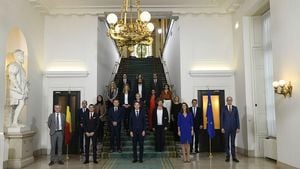Israeli Prime Minister Benjamin Netanyahu met with U.S. President Donald Trump on Tuesday to discuss the critically important Gaza hostage-release and ceasefire deal negotiations. This meeting marks the first face-to-face engagement between Trump and any foreign leader since his inauguration.
According to Israeli officials, the meeting holds significant weight for both nations, primarily because it will impact Israel’s position on the war against Hamas and the future of negotiations aimed at resolving the hostage situation. Prior to departing for Washington, Netanyahu emphasized, "It is a very important meeting. The fact this would be President Trump’s first meeting with a foreign leader since his inauguration is a testimony to the strength of the Israeli-American alliance. It’s also testimony to the strength of our personal friendship."
Central to the discussions is the future of Israel's conflict with Hamas and the political dynamics at play. Netanyahu faces severe pressure on various fronts—both from the families of hostages and from Israeli negotiators—who are anxious about whether he will commit to the second phase of the deal with Hamas. The deal could lead not only to the release of hostages but also to a long-term ceasefire and eventual withdrawal of Israeli forces from Gaza.
Initial negotiations for the second phase were expected to occur the week prior to the Trump meeting; nonetheless, Netanyahu opted out of sending his delegation to Qatar to speak with Hamas representatives. Israeli officials informed Axios, "Netanyahu decided not to send the negotiations team to Doha before he meets with Trump on Tuesday." The postponement of talks has raised concerns over the potential for prolonging the conflict.
Even as the clock ticks down on negotiations, it's evident Hamas is seeking to remain in power, which contradicts Israel's goal of dismantling the group. A senior Israeli official critically noted, “If Netanyahu decides not to move toward the second phase of the deal, the implication could be at least another year of war in Gaza.”
Despite the tension, Netanyahu argued there are positive angles to the upcoming discussions. He also aims to leverage Trump's influence to secure more favorable conditions for Israel’s position—specifically by showcasing the necessity of maintaining military pressure on Hamas. With normalization discussions with Saudi Arabia also on the agenda, Netanyahu is pushing for broader regional cooperation and peace alliances.
"We aspire to reach peace, and there's aspiration on the other side," said Omer Dostri, spokesperson for Netanyahu, acknowledging the challenges currently exacerbated by the raging conflict. Efforts for normalization are complicated, especially since Saudi Arabia has reportedly declared it will not engage fully with Israel until the war concludes.
Adding urgency to the negotiations, Trump’s administration is described by sources as actively engaging with the issue from its arrival. Unlike the previous administration, which maintained distance, Trump's team sees themselves as 'active negotiators.' This could mean potentially more aggressive stances on Israeli terms during the discussions.
The political stakes at this meeting are immense, not only for Netanyahu, who is battling for political survival, but for the future of peace negotiations between Israeli and Palestinian authorities. Netanyahu reflects on the altered Middle East dynamics, indicating, “The decisions we made in the war have already changed the face of the Middle East.”
With the backdrop of successful hostage releases under the truce, Netanyahu is also considering extending the ceasefire period, allowing for more negotiations without Hamas's condition of halting military operations, which Israel firmly rejects. This indicates the delicate balance of power and strategic maneuvering taking place as leaders from both sides navigate their respective political terrains.
Finally, as negotiations loom, the outcome of this meeting could set the tone for Israeli-Hamas relations for the foreseeable future, shaping the contours of power and governance within the volatile region. The eyes of both nations are focused on Washington, with many hoping for new understandings and pathways forward out of this enduring conflict.



